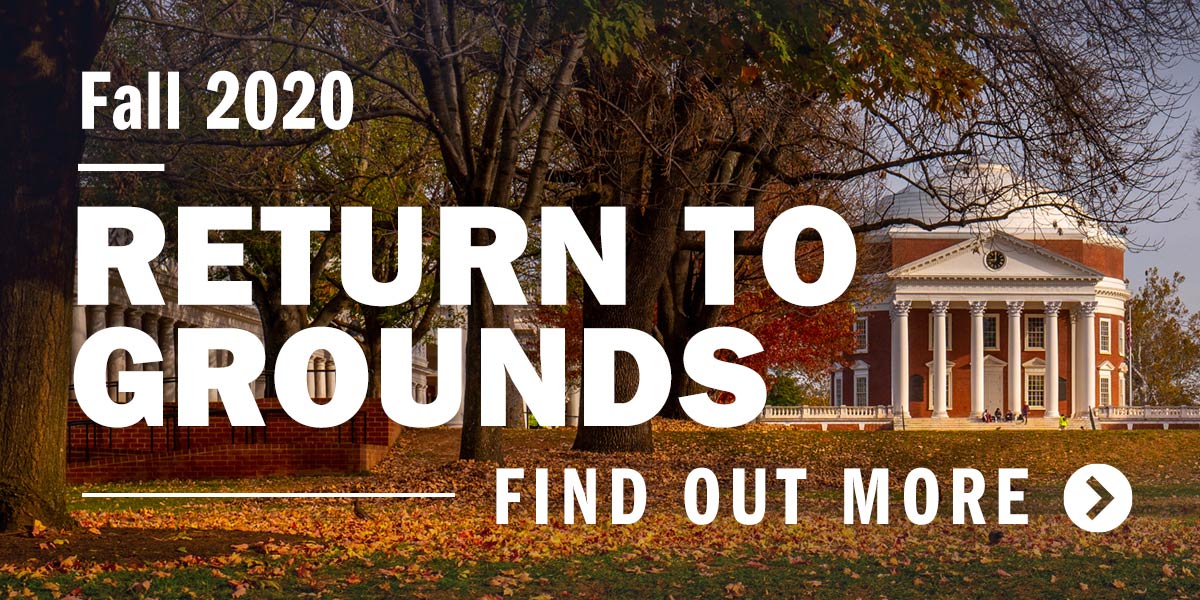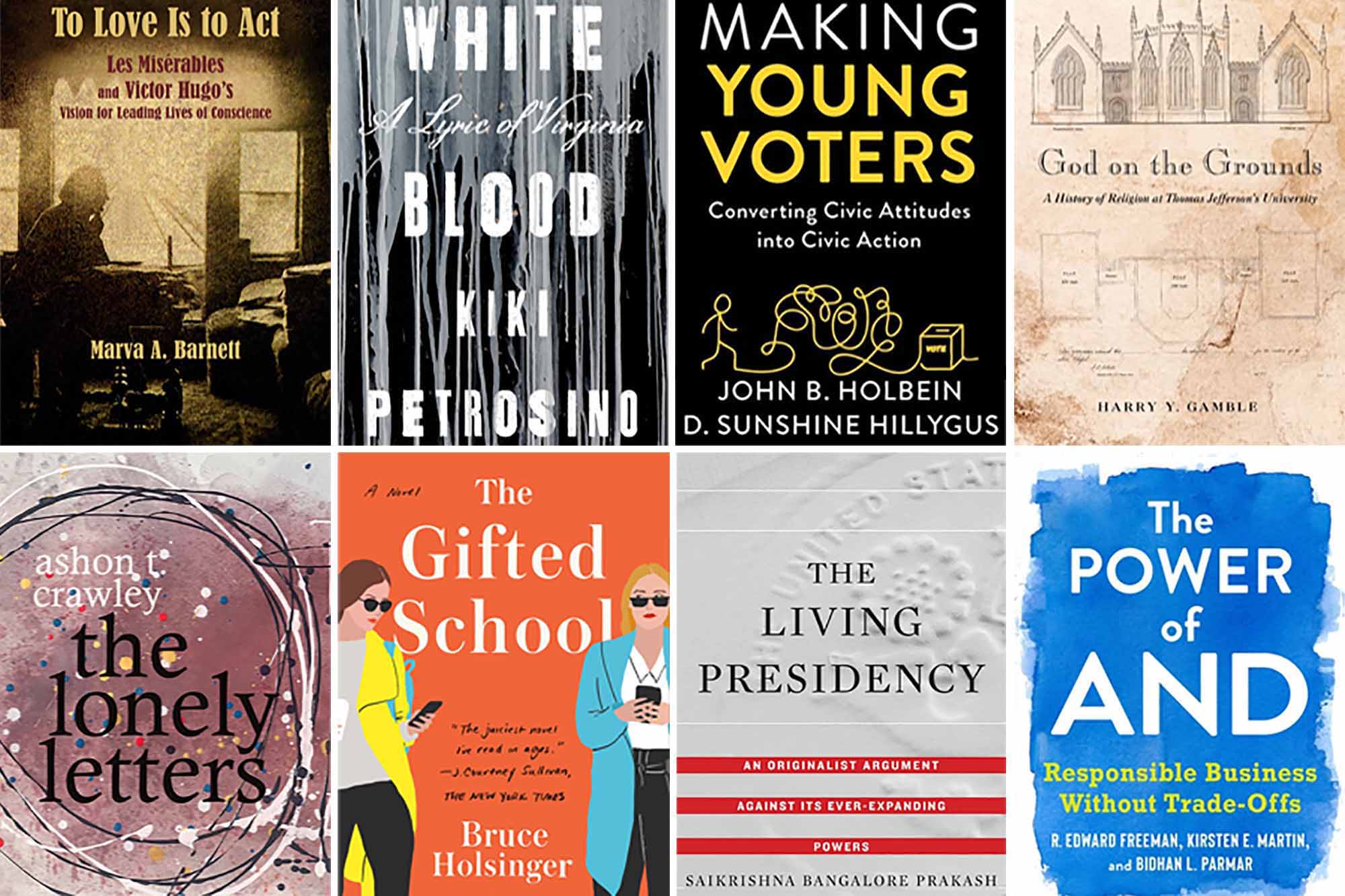Between University of Virginia faculty and alumni authors, it’s not difficult to come up with a summer reading list of new books that spills well into September.
There’s variety in subject matter, from novels in contemporary settings to genre-bending memoirs to studies of historical topics or politics. The titles mostly come from lists of new books compiled by the Office of the Vice President for Research (which posts new faculty books on its Top Shelf page) and the Creative Writing Program, which tracks books by its alumni. The UVA Bookstore’s Roy Cadoff and Patsy Goolsby also sent some recommendations.
The books that follow are organized alphabetically by author.
Marva Barnett, professor emeritus, “To Love Is to Act: ‘Les Misérables’ and Victor Hugo’s Vision for Leading Lives of Conscience.”
Barnett explores the power of “Les Misérables,” and how Victor Hugo’s life experiences provoke and inform a novel that challenges us to live our best possible lives. Her book includes interviews with creators of the popular stage and screen musical.Matthew Crawford, senior fellow, Institute for Advanced Studies in Culture, “Why We Drive: Toward a Philosophy of the Open Road.”
Crawford’s exploration of what he considers one of the few remaining domains of skill, exploration, play and freedom might seem nostalgic during this quarantine, as he takes the wheel to view the broader changes wrought by technology on all aspects of contemporary life.
Ashon Crawley, associate professor of African American and African Studies and religious studies, “The Lonely Letters.”
In “The Lonely Letters,” Ashon Crawley, writing as “A,” blends autobiography, fiction and philosophy, and meditates on the interrelation of “blackqueer” life, sounds of the Black church, theology, mysticism and love.

Joseph E. Davis, research professor of sociology, Institute for Advanced Studies in Culture, “Chemically Imbalanced: Everyday Suffering, Medication, and Our Troubled Quest for Self-Mastery.”
Davis warns that what we envision as a neurological revolution is leading us away from chances to enrich our souls and learn important truths about ourselves and the social conditions under which we live.
Emma Copley Eisenberg, M.F.A. 2015, “The Third Rainbow Girl: The Long Life of a Double Murder in Appalachia.”
In this true-crime exploration, Eisenberg, who grew up in New York, wrote about the 2010 Rainbow Murders, which she learned about while volunteering as a teacher at a summer camp for low-income girls in Appalachia. Reviews praise her reporting and insights.
UVA Darden School of Business professors R. Edward Freeman and Bidhan “Bobby” Parmar, with Kirsten Martin from George Washington University, “The Power of And: Responsible Business Without Trade-Offs.”
One reviewer said, “‘The Power of And’ shows that the old narrative, which tells us the only purpose of business is to maximize short-term profits for investors, is steadily being replaced with a new narrative that is more inclusive and comprehensive.”
Harry Y. Gamble, professor emeritus of religious studies, “God on the Grounds: A History of Religion at Thomas Jefferson’s University.”
Many people know Jefferson planned a secular college. So how did the University Chapel come to be? The University of Virginia Press published this in May.
Grace Elizabeth Hale, Commonwealth Professor of American Studies and History, “Cool Town: How Athens, Georgia, Launched Alternative Music and Changed American Culture.”
“Cool Town” reveals the passion, vitality and enduring significance of a bohemian scene in 1980s Athens, Georgia, that became a model for others to follow. Hale experienced the Athens scene as a student, an owner of a small business and a band member. Here she blends personal recollection with a historian’s eye in a story full of music and an unlikely cast of characters.
John Holbein, assistant professor at UVA’s Batten School of Leadership and Public Policy, and Sunshine Hillygus of Duke University, “Making Young Voters: Converting Civic Attitudes Into Civic Action.”
The authors write that young people care about politics and intend to vote, but often fail to follow through on those intentions because of personal and institutional distractions and barriers.
English professor Bruce Holsinger, “The Gifted School.”
Published last year in hardcover to much acclaim, the paperback was recently released. “It has quintessential summer cover art, so I can’t resist including it,” UVA Bookstore’s Goolsby said.
Lulu Miller, M.F.A. 2012, “Why Fish Don’t Exist: A Story of Loss, Love, and the Hidden Order of Life.”
Described as part history and part memoir, “Why Fish Don’t Exist” is Miller’s first book. She said in an interview she was inspired by scientist David Starr Jordan, who had spent his career identifying new species of fish until the 1906 San Francisco earthquake destroyed his work, but she calls this book “a cautionary tale.”
English professor Kiki Petrosino, “White Blood: A Lyric of Virginia.”
Petrosino explores her connections as a UVA alumna to her ancestral roots in Virginia in this new book.
Saikrishna Prakash, law professor, “The Living Presidency: An Originalist Argument Against Its Ever-Expanding Powers.”
Prakash’s scholarship focuses on the separation of powers, particularly executive powers.
Alexis Schaitki, M.F.A. 2013, “Saint X.”
The novel “is ostensibly about a young American girl who goes missing while on a family vacation in the Caribbean,” Cadoff wrote in email, “but it is more than that. The book also unpacks timely social and cultural issues – about grief, truth, white privilege and our murder-as-entertainment culture.”
Emily Temple, M.F.A. 2016, “The Lightness.”
This is Temple’s first novel, about a teenage girl who tries to find out what happened to her father, who disappeared at a meditation retreat center.
Rufi Thorpe, M.F.A. 2009, “The Knockout Queen.”
Thorpe’s third novel, this coming-of-age story focuses on two unlikely friends in a Southern California suburb.
Coming Soon
Micheline Aharonia Marcom, English professor in the Creative Writing Program, “The New American.”
This novel, due out in August, recounts the epic journey of a young Guatemalan-American college student, a “dreamer,” who gets deported and decides to make his way back home to California.
Daniel Mendelsohn, 1982 classics alumnus, “Three Rings: A Tale of Exile, Narrative, and Fate.”
Mendelsohn’s new book, to be published by UVA Press in September, is a hybrid of memoir, criticism, biography and fiction. It weaves together the lives of three exiled writers who turned to the classics of the past to create masterpieces of their own: François Fénelon, Erich Auerbach and W.G. Sebald.
Lisa Russ Spaar, English professor, “More Truly and More Strange: 100 Contemporary Self-Portrait Poems.”
Spaar, who edited this volume (due out in September) and wrote the introduction, directs the Creative Writing Program. She started exploring the topic while teaching a January term course several years ago, “Selfies Old and New: The Self-Portrait in Visual Art and Poetry.”
Media Contact
Article Information
July 8, 2020
/content/new-books-uva-authors-can-spice-your-summer-reading

